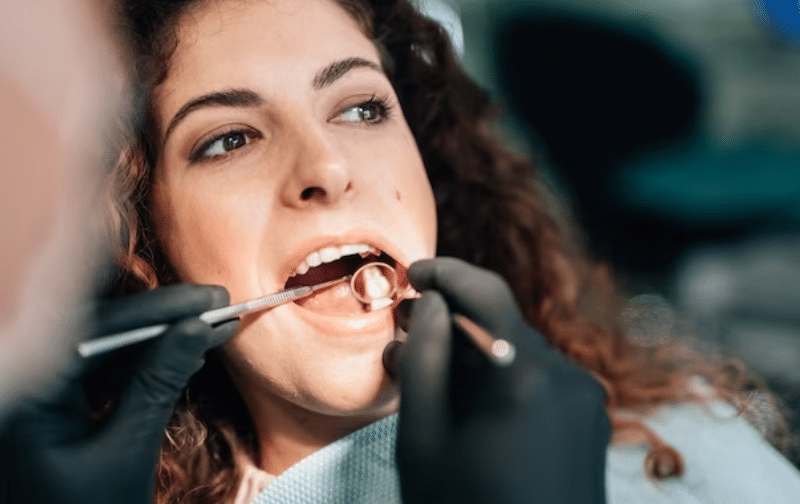A teeth crown is a type of dental restoration that covers the entire visible portion of a tooth. They are typically made from porcelain or ceramic, and are used to restore a tooth’s function and appearance after damage. Crowns can also be used to support a dental bridge, or to cover a tooth that has had a root canal.
Teeth crowns are an effective way to restore damaged teeth, and can give you back your smile. However, they are not without their risks and side effects. Before getting a teeth crown, it is important to talk to your dentist about the potential risks and benefits.
Benefits of Getting a Dental Crown
There are many benefits of getting a dental crown. They can help to:
- protect a weak tooth from breaking or further damage
- support a tooth with a large filling when there isn’t much tooth left
- hold together parts of a cracked tooth
- cover a misshapen or severely discoloured tooth
- attach a dental bridge
Dental crowns can also help to improve the appearance of your smile and give you back confidence in your teeth.
How Do Dental Crowns Work?
Dental crowns are an effective way to improve the appearance of your smile and protect your teeth from further damage. But how do they work?
A dental crown is a custom-made, tooth-shaped cap that is placed over a damaged or decayed tooth. The crown covers the entire visible portion of the tooth, restoring its natural shape and size. Crowns can also be used to support a dental bridge or to cover a dental implant.
The first step in getting a dental crown is to schedule a consultation with your dentist. During this appointment, your dentist will examine your mouth and determine if a crown is the best treatment option for you. If so, they will take impressions of your teeth and send them off to a dental laboratory where your custom crown will be made.
Once your crown is ready, you will return to the dentist office to have it fitted and cemented into place. It is important to care for your dental crown just as you would any other tooth in order to prolong its life and keep your smile looking its best!
Types of Dental Crowns
There are three main types of dental crowns:
Porcelain-fused-to-metal (PFM) Dental Crowns
Porcelain-fused-to-metal dental crowns are the most common type of crown. They are made of a metal alloy fused to a porcelain exterior. PFM crowns are strong and durable, and can be used on both front and back teeth.
All-Ceramic or All-Porcelain Dental Crowns
All-ceramic or all-porcelain dental crowns are made entirely of ceramic material. They are less visible than PFM crowns, making them a good choice for front teeth. However, they are not as strong as PFM crowns and may not be suitable for back teeth.
Gold Dental Crowns
Gold dental crowns are made of an alloy of gold, copper, and other metals. They are the strongest type of dental crown, but also the most visible. Gold crowns are usually only used on back teeth.
Reasons for Getting Teeth Crowns
There are many reasons why you might need to get a tooth crown. One common reason is to help protect a tooth that has been weakened by decay or injury. A dental crown can also be used to restore a tooth that has been broken or damaged.
Crowns can also be used for cosmetic purposes, such as to improve the appearance of misshapen or discolored teeth. In some cases, crowns are also used to support dental bridges or to cover up implants.
If you think you might need a dental crown, it’s important to talk to your dentist about all of your options. Together, you can decide if a tooth crown is right for you and which type of crown would be best suited for your needs.
What to Expect During the Procedure?
A dental crown procedure usually takes place over two visits to the dentist. During the first visit, the tooth will be prepared for the crown and a temporary one will be put in place. The second visit will be to check the fit of the permanent crown and make any adjustments, if necessary. It is important to follow all after-care instructions provided by your dentist to ensure a successful outcome.
Conclusion
In conclusion, teeth crowns can be an effective way to restore and protect damaged teeth. Knowing what to expect before getting a crown and understanding the different types of materials that are available is essential for making sure you get the best results from your procedure. While it’s important to talk with your dentist about any concerns you may have prior to getting a dental crown in Woodland Hills, rest assured that this type of dental restoration has been used successfully for many years and can help give you back the strong, healthy smile you deserve.
FAQs
1. How long does it take to get a dental crown?
It usually takes two visits to the dentist to get a crown. The first visit is to prepare the tooth and take an impression. The second visit is to place the permanent crown.
2. How much do dental crowns cost?
The cost of a dental crown varies depending on the material used and the tooth being treated. Porcelain or ceramic crowns tend to be more expensive than metal crowns. Insurance may cover some of the cost of a dental crown.
3. How long do dental crowns last?
With proper care, a dental crown can last for many years. However, they may eventually need to be replaced due to wear or damage.

